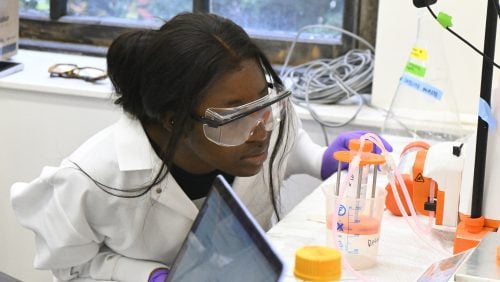| Application deadlines | Not offering spring 2026 admission February 15 for fall 2026 admission |
| Average time to degree completion | Three to four full-time semesters |
| Tuition (2025-2026) | $66,670 annually / $33,335 per semester More details |
| Funding support | All applicants are eligible and considered for departmental tuition scholarships |
No GRE required, and no application fee .
What makes us unique?
-

Study in a top-ranked program
We are No. 22 in U.S. News & World Report’s 2025–2026 graduate rankings.
-

Learn while gaining industry experience
Gain real work experience and build professional connections while earning academic credit and a salary through the Institute for NanoBioTechnology’s Master’s Co-op Program.
-

Paid Summer Internship at APL
Select exceptional master’s students can spend the summer gaining invaluable experience working alongside expert scientists and engineers at the Johns Hopkins Applied Physics Lab in Laurel, Maryland. Learn more.
About our program
Academic tracks that meet your needs
Select from four tracks of study:
- Academic (course-based)
- Essay/report-based
- Research-based
- Product design-based
- Industry-based (Institute for NanoBioTechnology’s Master’s Co-op Program)
You can tailor your studies to your specific interests
Acquire in-depth knowledge in areas relevant to your interests and goals by choosing from the following focus areas:
- Cellular, Molecular, and Biopharmaceutical Engineering
- Chemical and Sustainability Engineering
- Molecular Modeling, Data Science, and AI
We offer the courses master’s students want
Among our most popular courses are:
- Computational Protein Structure Prediction and Design
- Micro/Nanotechnology: The Science and Engineering of Small Structures
- Cancer Metabolism
- Future Food Manufacturing
"One of the big ideas in medicine—and this has been around in movies—is, ‘Can we enter the body with small things?'”
Inspired by nature, David Gracias builds micromachines that fold, stick, swim, and sense—all inside the human body. Gracias was recently named a Fellow of the National Academy of Inventors.
The ChemBE master's student experience
Faculty
Meet the faculty behind our field-leading research and in front of our classrooms. Meet our facultyIn the news...
Read about our latest achievements, new research tech, student highlights and more. Read MoreOutcomes-oriented
Our graduates are leaders in industry and entrepreneurs, working at the forefront of fields from pharmaceuticals and defense to biotech and cybersecurity. Today, the field of chemical engineering is evolving in expanding, thanks to the applications of AI and machine learning in areas including materials discovery, chemical process modeling, optimization, and more.
According to the Bureau of Labor Statistics, in 2024, the median salary for a chemical engineer was was $122,000 with projected employment growth of 7% in the field by 2033.
| Select Employers | ||||||||||||
|
Program Requirements
- Option 1: Research-Based MSE: A research-intensive MSE in which students take six 3-credit graduate-level courses and undertake original research. The end product of the research is in the form of an MSE Essay submitted to the university and a presentation open to the department. (See “Essay-Based Students” below for more details.) This option typically takes four semesters and the intervening summer to complete. It can be shorter for students who began working on their research project while an undergraduate at Hopkins (see “Combined BS/MSE Program and Students with BS in ChemBE from Johns Hopkins” below for more details) or for students who do their research through the INBT Co-op Program (see “INBT Industry Co-Op Program” below for more details).
- Option 2: Design-Based MSE: Similar to the research-based MSE option, except 3–4 semesters of Product Design are taken in addition to the six other graduate-level courses, and the end product is a written report and a presentation open to the department (see “Chemical Product Design Track (Design-Based MSE)” below for more details).
A coursework-only degree in which students take ten 3-credit graduate-level courses (see “All Students’ Course Requirements” below for more details). This option typically takes three semesters to complete. It can be shorter for students who began taking graduate-level courses while an undergraduate at Hopkins (see “Combined BS/MSE Program and Students with BS in ChemBE from Johns Hopkins” for more details).
Students must take three core courses; one from each of the following categories:
- Core 1 – Thermodynamics
- EN.540.671 “Advanced Thermodynamics in Practice”, typically offered in the Spring semester.
- With approval from the Director of Masters’ Studies and the instructor, this course may be substituted for the more advanced version, EN.540.630 “Thermodynamics & Statistical Mechanics”, typically offered in the Fall semester.
- Core 2 – Transport
- EN.540.604 “Transport Phenomena in Practice”, typically offered in the Spring semester.
- With approval from the Director of Masters’ Studies and the instructor, this course may be substituted for the more advanced version, EN.540.652 “Advanced Transport Phenomena”, typically offered in the Fall semester.
- Core 3 – Kinetics (Any one of the following courses)
- EN.540.602 “Metabolic Systems Biotechnology”
- EN.540.632 “Project in Design: Pharmacokinetics”
- EN.540.633 “Pharmacokinetics and Phamacodynamics”
- EN.540.638 “Advanced Topics in Pharmacokinetics and Pharmacodynamics I”
- EN.540.673 “Advanced Chemical Reaction Engineering in Practice”
- EN.540.681 “Molecular Kinetics and Catalysis”
- EN.540.695 “Special Topics in ChemBE: Pharmacokinetics and Pharmacodynamics of Food Metabolism”
- *note that other special topics will not be accepted
Substitutions for core courses are typically granted if students have ChemBE backgrounds.
- Between Core 1 and Core 2, only one of these two Cores may be substituted. (Students in the BS/MSE program may substitute for both Core 1 and Core 2.)
- Students cannot take both versions of the Core 1 courses and have them both count towards their course requirements, and likewise for Core 2. Multiple courses in Core 3 can be taken for course requirements; these excess courses would fall into elective slots.
- Students must enroll in EN.500.601 – Lab Safety in their first semester.
- Students who attended JHU for their undergrad program are exempt from this requirement if they took EN.540.490 – Introduction to Chemical Process Safety.
- Students must maintain full-time registration for all semesters. This means that students must always be registered for at least 9 credits. In semesters where students are pursuing research, they will register for as many credits as necessary of their advisor’s
research course (EN.540.801) to maintain the 9 total credits required. (For example, a student taking one 3-credit course would register for 6 credits of research with their advisor to maintain 9 credits for full-time status.) - Students must remain in good research standing with their research advisor. Failure to do so will result in probation and transfer to the course-based MSE track.
- Students must write an essay based on original research and literature review and present their results at an open seminar attended by faculty and students. The essay must be approved by the departmental graduate committee, which consists of at least (1) the graduate research advisor and (2) a faculty member, one of which must be a faculty member from the Department of Chemical and Biomolecular Engineering (primary or secondary appointment).
To broaden the practical training for Master of Science in Engineering (MSE) students in the Whiting School of Engineering, the Institute for NanoBioTechnology (INBT) collaborates with major industry partners to offer a credited and paid co-op opportunity to MSE students in the Chemical and Biomolecular Engineering, Materials Science and Engineering, and Mechanical Engineering programs.
ChemBE students pursuing the essay-based track have the opportunity to choose the co-op program as an alternative to conducting research in JHU laboratories. Students must apply through the INBT office during their first semester. (This application process is separate from, and happens after, being admitted to the ChemBE MSE program.)
Each student who is accepted to the program will be assigned a research advisor/mentor at the sponsoring company. The company is expected to develop a list of goals and development objectives for the student. Once the project has been determined, a few weeks prior to the start of the co-op or within the first week, students must find a faculty advisor with primary or secondary appointment in ChemBE. During the six-month co-op period, students will meet with the faculty advisor at least once every six weeks to provide progress updates. At the end of the co-op internship, students will complete an essay and present their results at an open seminar attended by faculty and students. The company mentor can serve as the student’s second reader as long as they have a PhD or commensurate work experience.
For more information, please visit https://inbt.jhu.edu/masters/.
Imagine yourself here
Baltimore has so much to offer. From vibrant and diverse neighborhoods with affordable housing, a farmers' market, excellent restaurants and the Baltimore Museum of Art just blocks from campus to professional sports teams, a rich history and a lively culture scene, make Baltimore a great place to call home.
Ready To Apply?
Get the information you need about our application process and financial aid, or get your application started today!
Advancing discovery

New methods for making smaller microchips - New materials and a novel process developed by Johns Hopkins scientists could aid efforts to develop smaller, faster, and affordable microchips to power a range of modern electronic devicesNew materials and a novel process developed by Johns Hopkins scientists could aid efforts to develop smaller, faster, and affordable microchips to power a range of modern electronic devices.

Are zombie cells harmful or helpful? - Researchers have identified three subtypes of senescent skin cells with distinct shapes, biomarkers, and functions—an advance that could equip scientists with the ability to target and kill the harmful types while leaving the helpful ones intact.





